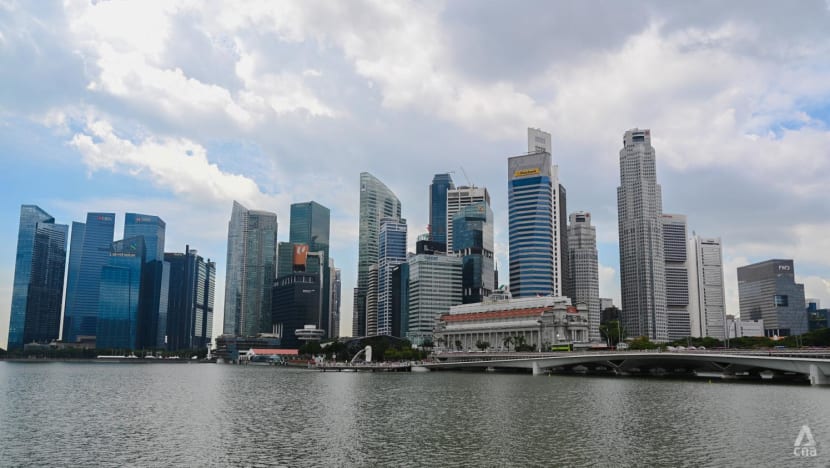Commentary: Singapore should export as much top talent as it imports
In addition to attracting top investment and talent here, Singapore should be exporting more local talent to the world stage, say the Center for Creative Leadership’s Elisa Mallis and Sunil Puri.

Buildings in Singapore's central business district on Nov 16, 2022. (File photo: CNA/Hanidah Amin)
SINGAPORE: As the global race for talent heats up, much has been said about the need to attract the best and the brightest to Singapore.
Singapore must expect to see greater contestation and fragmentation in the global economy, said Deputy Prime Minister and Finance Minister Lawrence Wong in his Budget 2023 speech on Feb 14. Observers speaking to CNA also said Singaporeans must be ready to seize new growth opportunities overseas.
Former actor James Lye's appointment as global head of international banking at Standard Chartered in October 2022 made headlines, with some commenting online that local talent taking up global roles seem rare.
There are Singaporeans flying the national flag high in multinational corporations. In 2019, Johnson & Johnson appointed Rowena Yeo, their first non-American chief technology officer. In 2020, food and beverage giant PepsiCo hired Tan Wern-Yuen as CEO of PepsiCo APAC. In 2021, Shou Zi Chew was named TikTok CEO.
But are these exceptions rather than the norm? The 2022 AmCham Singapore Manpower survey found that while Singaporeans make up more than half of the senior level workforce in 60 per cent of the organisations surveyed, the proportion of Singaporeans holding regional leadership roles have remained stagnant over the last year.
For a world-class business hub used to punching above its weight and always working to import top global talent, how can we also export more Singapore talent to the world stage?
GOING OVERSEAS EARLY IN A CAREER
What are the common threads that make up a global-ready Singapore leader? Our most recent Global Asian Leaders research uncovered a shared trait among Asian leaders who’ve seen success in global roles - early-career opportunities to work abroad.
Several leaders had opportunities for secondments outside of their home country, often through structured rotations as part of graduate induction programmes or early offshore projects.
There’s nothing like being immersed fully in a foreign environment to grasp the challenges of being a global leader, dealing with diverse teams that do not have the same working style nor approach problems in the same way as Singapore leaders may be used to.
For example, Cindy Ng, now senior VP global commercial at Terumo Blood and Cell Technologies, did a short stint in Shanghai where she led a team of Chinese nationals who had never had a non-native leader.
She initially had to overcome scepticism that she would do things the “Singaporean way” - with questions raised as to whether she would be able to keep pace with the demands of the Chinese market. She approached the team with humility and a spirit of collaboration - leveraging the extensive wealth of experience the team already had in the industry - and turned the business around.
Communicating with people with diverse backgrounds adds complexity not only because of language but also non-verbal cues and norms. Leaders like Eva Au, managing director APAC at IDC, who moved to Singapore from Canada described experiencing resistance the “Asian way” - never an outright “no”, but a “I’ll think about it” - when dealing with team members less comfortable speaking their minds. Those heading out of Singapore may have to learn to manage the converse situation as well.
Getting cross-border experiences under their belt early on enabled these leaders to step out of their comfort zone and appreciate how not everyone will approach a problem in the same way. This is critical to bridging differences in nationality, language and culture.
RAISE YOUR HAND
Young leaders will have to be their own “agents” and raise their hands for cross-geography projects, creating opportunities for themselves to try out different strategies and figure out their leadership style.
Going out of one’s comfort zone is never easy. Developing the skill to span cultural boundaries and overcome adversity in an unfamiliar environment will always involve some form of trial and error and learning how to be comfortable with discomfort. Getting cross-border experiences under their belt early gives leaders space for this.
And things don’t always have to fall neatly into some “obvious” career path with pre-planned milestones to hit. Non-obvious career paths can be a plus.
PepsiCo APAC CEO Wern-Yuen kickstarted his career in the Singapore Police Force before transitioning into the corporate world. Having interacted with people from all walks of life on the ground, he told the Center for Creative Leadership that he also learnt to value empathy and find common ground - key to helping him work across different markets and diverse teams.
Listen to CNA's Heart of the Matter:
For young leaders who find the idea of a Pacific jump daunting, there are a multitude of opportunities even a little closer to home. Southeast Asia is one of the world’s fastest-growing regions and presents excellent opportunities for learning and growth, such as in regional offices of multinational companies.
The transition from Singapore to these countries may well also take less of a toll on budding young leaders - be it due to the time zone or a more familiar Asian business culture.
PIPELINE OF GLOBAL-READY SINGAPOREAN LEADERS
Yet, the long-term success of Singapore as a global business hub goes beyond just nurturing outstanding individual leaders.
Singaporean leaders the Center for Creative Leadership spoke to say they “pay it forward” - mentoring, sponsoring and being role models to young leaders.
On the organisational level, it is crucial that businesses take deliberate steps to nurture local talent and ensure that they are set up for success. Citi Singapore, for instance, launched a network to engage Singaporean employees who are based abroad and create opportunities for local staff to hear about what it’s like to work overseas.
Companies that are serious about investing in local leaders should also look at establishing dedicated talent programmes and committees that consistently evaluate the leader pipeline heath and implement interventions when necessary to ensure the resilience of a business with a steady and reliable line of leadership talent.
More can still be done to facilitate formal and informal mentoring opportunities. The Singapore Leaders Network (SGLN) is a step in the right direction by bringing people at different stages of their careers together through dialogues, workshops, and a mentoring programme.
Building a pipeline of global Singaporean leaders - exporting as much as importing talent - will solidify our status as a successful global hub with a world-class talent pool. And in doing so, Singapore will continue to remain attractive for foreign investments, and establish our place on the global stage.
Elisa Mallis is Managing Director and Vice President, APAC and Sunil Puri is former Senior Director and Head of Asia Research, at the Center for Creative Leadership.





















